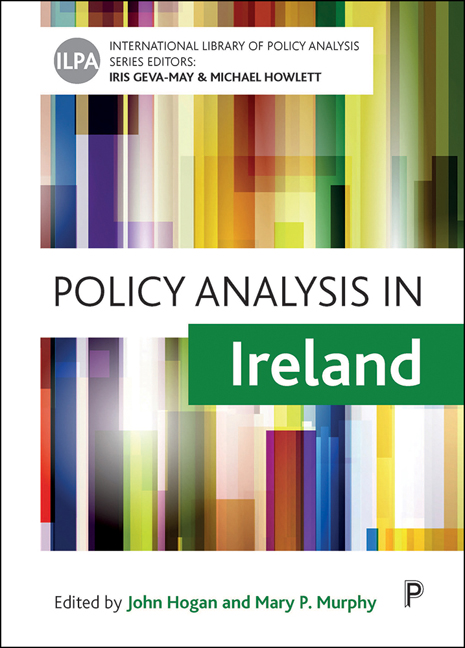Book contents
- Frontmatter
- Contents
- List of figures, tables and boxes
- List of abbreviations
- Notes on contributors
- Editors’ introduction to the series
- Acknowledgements
- Foreword
- Preface
- one Contextualising policy analysis in Ireland
- Part One: History, styles and methods of policy analysis in Ireland
- Part Two: Policy analysis at various levels of government: from local to the EU
- Part Three: Think tanks, interest groups, political parties and gender-based policy analysis
- Part Four: The public, science and the media: the wider policy analysis environment in Ireland
- Index
fourteen - Gender expertise and policy analysis
Published online by Cambridge University Press: 18 December 2021
- Frontmatter
- Contents
- List of figures, tables and boxes
- List of abbreviations
- Notes on contributors
- Editors’ introduction to the series
- Acknowledgements
- Foreword
- Preface
- one Contextualising policy analysis in Ireland
- Part One: History, styles and methods of policy analysis in Ireland
- Part Two: Policy analysis at various levels of government: from local to the EU
- Part Three: Think tanks, interest groups, political parties and gender-based policy analysis
- Part Four: The public, science and the media: the wider policy analysis environment in Ireland
- Index
Summary
Introduction
Phillips (2007, p 505) defines policy capacity as ‘the ability to provide policy analysis and advice, participate effectively and exert influence in policy development’. Gendering policy analysis requires capacity to have sufficient expertise to apply gender as a variable in the different processes that combine to generate policy analysis, including research and knowledge production. Gender expertise features as a component of policy analysis at different levels of governance and is used to inform and legitimate decisions of corporations, local, regional and national governments, intergovernmental organisations, and non-governmental organisations (NGOs) (Kunz et al, 2019). The individuals and institutions that offer gender expertise vary, as do the activities performed by them. Academics, private consultancy firms, NGOs, women's policy agencies and bureaucrats provide gender expertise through activities such as gender audits, gender budgeting, research and analysis, gender consultation, gender training and gender assessments. While the number of organisations both seeking and providing expertise seems to have increased, the question of what constitutes gender expertise remains open to debate (Hoard, 2015, p 22). This chapter seeks to answer that and other questions. How is gender expertise understood and operationalised in Irish policy? How has it featured in Irish public policy analysis and to what effect? In conceptual terms, the aim is to characterise gender expertise in terms of its content, objectives and practice, and understand common factors that lead to the advice and recommendations of gender experts being incorporated into public policy.
The United Nations (UN), the World Bank and the International Labour Organization, alongside the European Union (EU), are but a few of the most prominent contexts where such gender expertise on issues including gender and violent conflict, gender and labour market participation, gender and health outcomes and gender and education proliferate. As Kunz and Prügl (2019, p 4) in their account of the state of gender expertise observe, ‘the salience given to gender equality in international policymaking, including most recently the sustainable development goals (SDGs), has raised new demands for gender expertise in areas ranging from health and education, to clean water and climate change’.
Gender expertise is a form of knowledge that has a material, social and discursive impact (Verloo and Lombardo, 2007; Bacchi, 2009) and that operates within relations and networks of actors across time and space with powerful effects.
- Type
- Chapter
- Information
- Policy Analysis in Ireland , pp. 203 - 216Publisher: Bristol University PressPrint publication year: 2021



